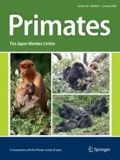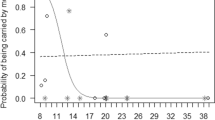Abstract
Immature indivuduals influence the formation and maintenance of social relationships within groups in diverse ways. Because of the increased interest of group members toward newborns, lactating females may use infants as social tools to temporally gain rank positions in matrilineal societies, and differential support received by the mothers may bias the network of immatures born to females of different ranks. In this study, we investigated the changes in proximity, grooming, play, and agonism networks of lactating females and immatures of different developmental periods, sex, and mothers’ dominance rank. A semi-free-ranging group of 22 capuchin monkeys (Sapajus spp) was monitored for 12 months, totaling over 300 hours of observation. During this period, the age changes of 13 immatures were monitored and recorded. Best regression models showed that an increased number of grooming partners while lactating did not translate into changes in the proximity or agonistic network positions for females. Age was the main predictor of social network changes, while sex had a minor influence on the play network and no influence on the grooming or agonistic networks. Finally, mothers’ rank predicted differences in the affiliative but not the agonistic social network. This pattern points to a more affiliative and individual-based rather than agonistic and nepotism-based strategy for social network insertion, which can be explained by the decreased competition faced by the focal group and by the behavioral flexibility of the clade.


Similar content being viewed by others
References
Altmann J (1974) Observational study of behavior: sampling methods. Behaviour 49:227–267
Archie EA, Tung J, Clark M, Altmann J, Alberts SC (2014) Social affiliation matters: both same-sex and opposite-sex relationships predict survival in wild female baboons. Proc R Soc B: Biol Sci. https://doi.org/10.1098/rspb.2014.1261
Back JP, Suzin A, Aguiar LM (2019) Activity budget and social behavior of urban capuchin monkeys, Sapajus sp. (Primates: Cebidae). Zoologia 36:1–10. https://doi.org/10.3897/zoologia.36.e30845
Baldovino MC, Di Bitetti MS (2008) Allonursing in tufted capuchin monkeys (Cebus nigritus): Milk or pacifier? Folia Primatol 79:79–92. https://doi.org/10.1159/000108780
Barrett BJ, Monteza-Moreno CM et al (2018) Habitual stone-tool-aided extractive foraging in white-faced capuchins Cebus Capucinos. R Soc Open Sci. https://doi.org/10.1098/rsos.181002
Borgatti SP, Everett MG, Johnson JC (2018) Analyzing social networks. Sage, London
Burnham KP, Anderson DR, Huyvaert KP (2011) AIC model selection and multimodel inference in behavioral ecology: some background, observations, and comparisons. Behav Ecol Sociobiol 65:23–35. https://doi.org/10.1007/s00265-010-1029-6
Coelho CG, Falótico T, Izar P et al (2015) Social learning strategies for nut-cracking by tufted capuchin monkeys (Sapajus spp.). Anim Cogn 18:911–919. https://doi.org/10.1007/s10071-015-0861-5
De Waal FBM, Luttrell LM, Canfield ME (1993) Preliminary data on voluntary food sharing in brown capuchin monkeys. Am J Primatol 29:73–78. https://doi.org/10.1002/ajp.1350290108
Farine DR, Whitehead H (2015) Constructing, conducting, and interpreting animal social network analysis. J Anim Ecol 84(5):1144–1163. https://doi.org/10.1111/1365-2656.12418
Fedurek P, Lehmann J (2017) The effect of excluding juveniles on apparent adult olive baboons (Papio anubis) social networks. PLoS ONE 12:5–7. https://doi.org/10.1371/journal.pone.0173146
Ferreira RG, Resende BD, Mannu M, Otonni EB, Izar P (2002) Bird predation and prey transfer in brown capuchin monkeys. Neotrop Primates 10:84–89
Ferreira RG, Izar P, Lee PC (2006) Exchange, affiliation, and protective interventions in semi free-ranging brown capuchin monkeys (Cebus apella). Am J Primatol 68:765–776. https://doi.org/10.1002/ajp.20277
Ferreira RG, Emidio RA, Jerusalinsky L (2010) Three stones for three seeds: natural occurrence of selective tool use by capuchins (Cebus libidinosus) based on an analysis of the weight of stones found at nutting sites. Am J Primatol 72:270–275. https://doi.org/10.1002/ajp.20771
Fragaszy DM, Adams-Curtis LE (1997) Developmental changes in the manipulation in tufted capuchins (Cebus apella) from birth through 2 years and their relation to foraging and weaning. J Comp Psychol 111:201–211. https://doi.org/10.1037/0735-7036.111.2.201
Fragaszy DM, Visalberghi E, Fedigan LM (2004) Development. The complete capuchin: the biology of the genus Cebus, Illustrated. Cambridge university press, Cambridge, pp 104–123
Frank R, Silk J (2009) Grooming exchange between mothers and non-mothers: the price of natal attraction in wild baboons (Papio anubis). Behaviour 146:889–906. https://doi.org/10.1163/156853908X396656
Fruteau C, de Wall E, van Damme E, Noe R (2011) Infant access and handling in sooty mangabeys and vervet monkeys. Anim Behav 81:153–161. https://doi.org/10.1016/j.anbehav.2010.09.028
Gumert MD (2007) Grooming and infant handling interchange in Macaca fascicularis: the relationship between infant supply and grooming payment. Int J Primatol 28:1059–1074. https://doi.org/10.1007/s10764-007-9202-0
Henkel S, Heistermann M, Fischer J (2010) Infants as costly social tools in male barbary macaque networks. Anim Behav 79:1199–1204. https://doi.org/10.1016/j.anbehav.2010.02.005
Hinde RA (1976) Interactions, relationships, and social structure. Man 11:1–17. https://doi.org/10.2307/2800384
Isbell LA, Young TP (2002) Ecological models of female social relationships in primates: similarities, disparities, and some directions for future clarity. Behaviour 139:177–202. https://doi.org/10.1163/156853902760102645
Izar P (2004) Female social relationships of Cebus apella nigritus in a southeastern atlantic forest: an analysis through ecological models of primates social evolution. Behaviour 144:71–99. https://doi.org/10.1163/156853904772746619
Izar P, Resende B, Verderane M, Ferreira RG (2004) Reproduction in semi-free-ranging capuchin monkeys (Cebus apella). Folia Primatol 75:284–284
Izar P, Ferreira RG, Sato T (2006) Describing the organization of dominance relationships by dominance-directed tree method. Am J Primatol 68:189–207. https://doi.org/10.1002/ajp.20216
Izar P, Verderane MP, Peternelli-dos-Santos et al (2012) Flexible and conservative features of social systems in tufted capuchin monkeys: comparing the socioecology of Sapajus libidinosus and Sapajus nigritus. Am J Primatol 74:315–331. https://doi.org/10.1002/ajp.20968
Izawa (1980) Social behavior of wild black-capped capuchin (Cebus apella). Primates 21(4):443–467. https://doi.org/10.1007/BF02373834
Janson CH (1988) Food competition in brown capuchin monkeys (Cebus apella): quantitative effects of group size and tree productivity. Behaviour 105:53–76
Joffe TH (1997) Social pressures have selected for an extended juvenile period in primates. J Hum Evol 32:593–605
Kasper C, Voelkl B (2009) A social network analysis of primate groups. Primates 50:343–356. https://doi.org/10.1007/s10329-009-0153-2
Kato E (1999) Effects of age, dominance, and seasonal changes on proximity relationships in female Japanese macaques (Macaca fuscata) in a free-ranging group at Katsuyama. Primates 40:291–300. https://doi.org/10.1007/BF02557553
Kulik L, Amici F et al (2015a) Sex differences in the development of aggressive behavior in rhesus macaques (Macaca mulatta). Int J Primatol 36:764–789. https://doi.org/10.1007/s10764-015-9853-1
Kulik L, Amici F, Langos D, Widdig A (2015b) Sex differences in the development of social relationships in rhesus macaques (Macaca mulatta). Int J Primatol 2:353–376. https://doi.org/10.1007/s10764-015-9826-4
Lehmann J, Majolo B, McFarland R (2016) The effects of social network position on the survival of wild barbary macaques, Macaca sylvanus. Behav Ecol 27:20–28. https://doi.org/10.1093/beheco/arv169
Liao Z, Sosa S, Wu C, Zhang P (2018) The influence of age on wild rhesus macaques’ affiliative social interactions. Am J Primatol 80(2):e22733. https://doi.org/10.1002/ajp.22733
MacKinnon KC (2002) Social development of wild white-faced capuchin monkeys (Cebus capucinus) in Costa Rica: an examination of social interactions between immatures and adult males. Dissertation, University of California
MacKinnon KC (2004) Infant-carrying by non-mothers in wild white-faced capuchin monkeys (Cebus capucinus): do infants have preferential transportation partners? Am J Primatol 62:80–81
Maestripieri D (1994) Social structure, infant handling, and mothering styles in group-living old world monkeys. Int J Primatol 15:531–553. https://doi.org/10.1007/BF02735970
Makagon MM, McCowan B, Mench JA (2012) How can social network analysis contribute to social behavior research in applied ethology? Appl Anim Behav Sci 138:152–161. https://doi.org/10.1016/j.applanim.2012.02.003
Miller RE, William FC, Arthur I, M (1967) Communication of effects between feral and socially isolated monkeys. J Pers Soc Psychol 7:231–239
Noe R, Hammerstein P (1994) Biological markets: supply and demand determine the effect of partner choice in cooperation, mutualism, and mating. Behav Ecol Sociobiol 35:1–11. https://doi.org/10.1007/BF00167053
O’Brien TG, Robinson JG (1991) Allomaternal care by female wedge-capped capuchin monkeys: effects of age, rank, and relatedness. Behaviour 119:30–50. https://www.jstor.org/stable/4534974
O’Brien TG (1993) Asymmetries in grooming interactions between juvenile and adult female wedge-capped capuchin monkeys. Anim Behav 46:929–938. https://doi.org/10.1006/anbe.1993.1274
Palagi E (2018) Not just for fun! social play as a springboard for adult social competence in human and non-human primates. Behav Ecol Sociobiol 72:90. https://doi.org/10.1007/s00265-018-2506-6
Patzelt A, Kopp GH, Ndao I et al (2014) Male tolerance and male-male bonds in multilevel primate society. Proc Natl Acad Sci USA 111:14740–14745. https://doi.org/10.1073/pnas.1405811111
Paukner A, Suomi SJ (2008) Sex differences in play behavior in juvenile tufted capuchin monkeys (Cebus apella). Primates 49:288–291. https://doi.org/10.1007/s10329-008-0095-0
Rapaport LG, Brown GR (2008) Social influences on foraging behavior in young nonhuman primates: learning what, where, and how to eat. Evol Anthropol 17:189–201. https://doi.org/10.1002/evan.20180
Reader SM, Hager Y, Laland KN (2011) The evolution of primate general and cultural intelligence. Phil Trans R Soc Lond B. https://doi.org/10.1098/rstb.2010.0342
Resende B, Izar P, Ottoni EB (2004) Social play and spatial tolerance in tufted capuchin monkeys (Cebus apella). Rev Etol 6:55–61
Resende BD, Ottoni EB, Fragaszy DM (2008) Ontogeny of manipulative behavior and nut-cracking in young tufted capuchin monkeys (Cebus apella): a perception-action perspective. Dev Sci 11:828–840. https://doi.org/10.1111/j.1467-7687.2008.00731.x
Robinson J, Janson C (2008) Capuchins, squirrel monkeys, and atelines: socioecological convergence with old world primates. In: Smuts B, Cheney D, Seyfarth R, Wrangham R (eds) Primates Societies. University of Chicago press, Chicago, pp 69–82
Silk JB (1999) Why are infants so attractive to others? The form and function of infant handling in bonnet macaques. Anim Behav 57:1021–1032. https://doi.org/10.1006/anbe.1998.1065
Slater KY, Schaffner CM, Aureli F (2007) Embraces for infant handling in spider monkeys: evidence for a biological market? Anim Behav 74:455–461. https://doi.org/10.1016/j.anbehav.2006.11.026
Smith-Aguilar SE, Aureli F, Busia L, Schaffner C, Ramos-Fernandez G (2019) Usind multiplex networks to capture the multidimensional nature of the social structure. Primates 60:277–295. https://doi.org/10.1007/s10329-018-0686-3
Sneel-Rood EC (2012) Selective processes in development: implications for the costs and benefits of phenotypic plasticity. Integr Comp Biol 52:31–42. https://doi.org/10.1093/icb/ics067
Sosa AV (2016) Association of the type of toy used during play with the quantity and quality of parent-infant communication. JAMA Pediatr 170:132–137. https://doi.org/10.1001/jamapediatrics.2015.3753
Sterck EHM, Watts DP (1997) The evolution of female social relationships in nonhuman primates. Behav Ecol Sociobiol 41:291–309. https://doi.org/10.1007/s002650050390
Strier KB (1993) Growing up in a patrifocal society: sex differences in the spatial relations of immature muriquis. In: Pereira M, Fairbanks L (eds) Juveniles primates. Oxford University press, New York, pp 139–147
Suomi SJ (2005) Mother-infant attachment, peer relationships, and the development of social networks in rhesus monkeys. Hum Dev 48:67–79. https://doi.org/10.1159/000083216
Takimoto A, Kuroshima H, Fujita K (2010) Capuchin monkeys (Cebus apella) are sensitive to others’ reward: an experimental analysis of food-choice for conspecifics. Anim Cogn 13:249–261. https://doi.org/10.1007/s10071-009-0262-8
Tiddi B, Aureli F, Schino G (2010) Grooming for infant handling in tufted capuchin monkeys: a reappraisal of the primate infant market. Anim Behav 79:1115–1123. https://doi.org/10.1016/j.anbehav.2010.02.008
Tiddi B, Aureli F, di Sorrentino EP, Janson CH, Schino G (2011a) Grooming for tolerance? Two mechanisms of exchange in wild tufted capuchin monkeys. Behav Ecol 22(3):663–669. https://doi.org/10.1093/beheco/arr028
Tiddi B, Aureli F, Schino G, Voelkl B (2011b) Social relationships between adult females and the alpha male in wild tufted capuchin monkeys. Am J Primatol 73:812–820. https://doi.org/10.1002/ajp.20939
Verderane MP, Izar P (2019) Maternal care styles in primates: considering a new world species. Psicol USP 30:1–11. https://doi.org/10.1590/0103-6564e190055
Visalberghi E, Fragaszy DM, Savage-Rumbaugh S (1995) Performance in a tool-using task by common chimpanzees (Pan troglodytes), bonobos (Pan paniscus) an orangutan (Pongo pygmaeus), and capuchin monkeys (Cebus apella). J Comp Psychol 109(1):5–60. https://doi.org/10.1037/0735-7036.109.1.52
Walters JR, Seyfarth RM (1987) Conflict and cooperation. In: Cheney D, Seyfarth R, Wrangham R, Struhsaker T (eds) Smuts. Primate Societies, University of Chicago Press, Chicago, pp 306–317
Wei W, Qi XG, Garber PA, Guo S, Zhang P, Li B (2013) Supply and demand determine the market value of access to infants in the golden snub-nosed monkey (Rhinopithecus roxellana). PLoS ONE 8:e65962. https://doi.org/10.1371/journal.pone.0065962
Whitehead H (2008) Analyzing animal societies: quantitative methods for vertebrate social analysis. University of Chicago Press, Chicago
Wooddell LJ, Simpson EA, Murphy AM, Dettmer AM, Paukner A (2019) Interindividual differences in neonatal sociality and emotionality predict juvenile social status in rhesus monkeys. Dev Sci 22:e12749. https://doi.org/10.1111/desc.12749
Acknowledgements
This research was partially supported by the Brazilian Research Council (CNPq) and Coordenação de Aperfeiçoamento de Nível Superior (CAPES).
Author information
Authors and Affiliations
Corresponding author
Additional information
Publisher's Note
Springer Nature remains neutral with regard to jurisdictional claims in published maps and institutional affiliations.
Supplementary Information
Below is the link to the electronic supplementary material.
About this article
Cite this article
de Lima, V.C.C., Ferreira, R.G. Social network changes during the development of immature capuchin monkeys (Sapajus spp.). Primates 62, 801–815 (2021). https://doi.org/10.1007/s10329-021-00918-6
Received:
Accepted:
Published:
Issue Date:
DOI: https://doi.org/10.1007/s10329-021-00918-6




